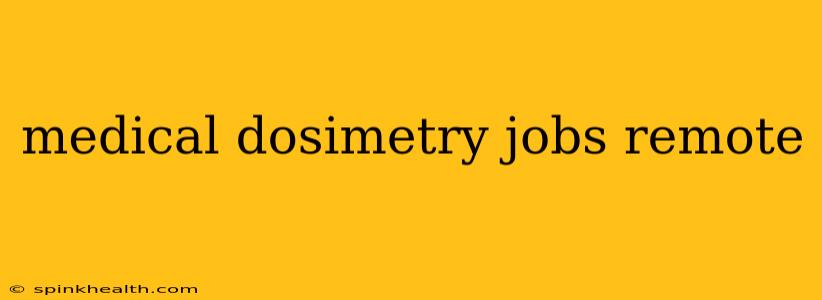The field of medical dosimetry, a crucial element of radiation oncology, is experiencing a fascinating shift. While traditionally associated with hands-on work in hospital settings, the rise of remote work opportunities is changing the game. This opens exciting possibilities for experienced dosimetrists and those entering the profession. Let's explore the world of remote medical dosimetry jobs and answer some frequently asked questions.
What is Medical Dosimetry?
Before we dive into remote opportunities, let's establish a clear understanding of the profession. Medical dosimetry involves calculating and delivering precise radiation doses to cancer patients undergoing radiotherapy. Dosimetrists are highly trained professionals who use sophisticated software and equipment to create treatment plans that maximize tumor destruction while minimizing damage to healthy tissues. Their work is incredibly precise and demands meticulous attention to detail – a life-saving role that requires both scientific expertise and a compassionate heart.
Are There Remote Medical Dosimetry Jobs?
The answer is a resounding "yes," but with important caveats. While fully remote, entirely independent dosimetry positions are rare due to regulatory requirements and the need for collaboration with medical teams, many opportunities offer remote elements or hybrid models. These can include:
- Remote Plan Checking/Review: Experienced dosimetrists can often work remotely reviewing treatment plans created by colleagues in a hospital setting. This involves meticulous analysis of dose distributions, ensuring accuracy and compliance with safety protocols.
- Remote Consulting: Dosimetrists can leverage their expertise through remote consulting roles, advising clinics and hospitals on treatment planning techniques, quality assurance programs, and regulatory compliance.
- Remote Training & Education: Dosimetrists might find remote roles in training other professionals, either through online courses or virtual workshops on dosimetry techniques and software.
- Hybrid Models: Many institutions now offer hybrid models where dosimetrists spend some time on-site for collaboration and hands-on tasks, while conducting other aspects of their work remotely.
What Skills Are Needed for Remote Medical Dosimetry Jobs?
Beyond the fundamental dosimetry knowledge and certifications, success in remote medical dosimetry jobs requires a specific skill set:
- Proficiency in Dosimetry Software: Thorough understanding and expertise in treatment planning systems like Eclipse, Pinnacle, and others is essential.
- Strong Communication Skills: Remote work necessitates excellent written and verbal communication, as collaboration with colleagues and physicians is crucial.
- Technological Proficiency: Dosimetrists need to be comfortable with various technologies, including remote access software, virtual meeting platforms, and electronic health record (EHR) systems.
- Problem-Solving Abilities: Independent problem-solving is crucial in remote roles, requiring the ability to analyze issues and find solutions without immediate on-site support.
- Self-Discipline & Time Management: Working remotely demands exceptional self-discipline and the ability to manage time effectively to meet deadlines and maintain productivity.
What are the Challenges of Remote Medical Dosimetry Jobs?
While remote options offer flexibility, several challenges exist:
- Regulatory Compliance: Maintaining strict adherence to regulatory guidelines and safety protocols is paramount. Remote work requires extra diligence in this aspect.
- Technical Issues: Reliable internet connectivity and access to necessary software and hardware are crucial. Technical glitches can significantly disrupt workflow.
- Collaboration Difficulties: Effective communication and collaboration with on-site teams can be more challenging in a remote setting.
- Isolation: Working remotely can lead to feelings of isolation, requiring proactive efforts to maintain professional networks and connections.
How Can I Find Remote Medical Dosimetry Jobs?
Finding remote dosimetry opportunities often requires a proactive approach:
- Online Job Boards: Utilize specialized healthcare job boards and general platforms, carefully filtering for remote or hybrid positions.
- Networking: Attend virtual conferences and webinars related to medical physics and dosimetry to connect with potential employers.
- Direct Application: Reach out directly to hospitals and clinics, expressing your interest in remote or hybrid work arrangements.
The landscape of medical dosimetry jobs is evolving, with increasing opportunities for remote work. While not all positions are fully remote, the trend toward hybrid models and remote components opens exciting new avenues for dosimetrists seeking work-life balance and career flexibility. With the right skills and proactive approach, navigating this evolving field can lead to a rewarding and fulfilling career.

